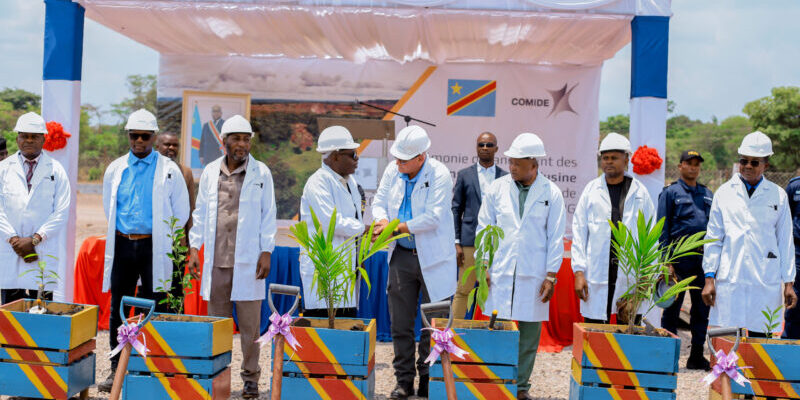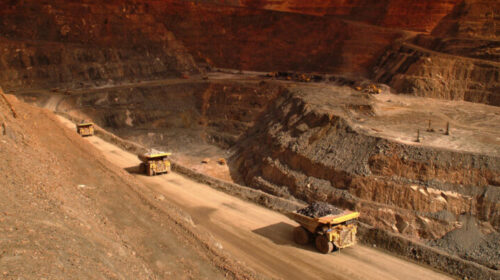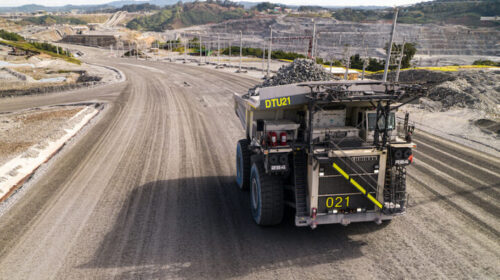ERG Breaks Ground on Hydrometallurgical Plant in DRC for Copper and Cobalt Production
COMIDE comprises some of the largest known copper and cobalt resources still to be developed globally. Following a comprehensive technical study, the development potential of its resource base and production capacity were established, paving the way for the project at hand.
The COMIDE project includes the construction of a hydrometallurgical plant, an extensive exploration and drilling programme, as well as mine development – backed by a total investment of around USD$800 million.
The start of works was marked by a groundbreaking ceremony held at COMIDE in Lualaba Province on 12 October 2023.
The hydrometallurgical plant, which is expected to be complete by the end of 2025, will be constructed in three phases. During the first and second phases, the plant will produce an estimated 40,000 tonnes of copper cathode and 7,000 tonnes of cobalt hydroxide annually.
The third phase is projected to yield up to 80,000 tonnes of copper cathode and 14,000 tonnes of cobalt hydroxide per annum, with the potential for further expansion to reach a production capacity of 120,000 tonnes of copper cathode a year.
Speaking on behalf of ERG Africa’s Acting Chief Executive Officer, Mr Sergei Verbitckii, Chief of Staff, Mr Joachim Nzuzi, stated, “The design of this project was developed with innovation and sustainability top of mind.
The plant will be equipped with the latest technology to ensure that we maximise recovery, while reducing the impact on the environment.”
ERG’s mission is to unlock the potential of the Earth and its people, to ensure the prosperity of those who rely on us – and to do so responsibly.
As such, the ERG Clean Cobalt & Copper Framework – which guides our production of these two critical minerals– will be extended to COMIDE.
This responsible approach to production not only helps us establish a sustainable value chain, fight child labour, and protect human rights, but also ensures that we not only meet, but exceed the Organisation for Economic Co-operation and Development’s (OECD) standards for responsible production.
“Aligned to ERG’s commitment to environmental stewardship, we are not only celebrating the building of a plant and the development of a mine today.
We are also committing to a greener tomorrow, not only through our approach to responsible mining and producing the critical mineral required for the green energy transition, but also by restoring the ecosystems on our site and in the surrounding areas.
Thus, before we have even started construction work, we teamed up with the University of Lubumbashi to establish a nursery that will provide the trees we will plant to ensure that after our mining activities eventually cease, the site will house many more trees than before we started the project. We already have 700 trees in our nursery and are currently seeding 2,000 more,” Mr Nzuzi added.
Addressing the gathering, His Excellency, Provincial Minister of Interior and Security of Lualaba Province, Mr Kapenda Wa Kapenda Déodat, representing Her Excellency, the Governor of Lualaba Province, Ms Fifi Masuka Saini said, “His Excellence, the President of the DRC, Félix-Antoine Tshisekedi Tshilombo, has made social peace and development his top priority, encapsulated in his sacred principle, ‘Putting the people first.’ He also emphasises that all partnerships within the DRC should be mutually beneficial, adhering to the principle of win-win.
It is within this same philosophy that Ms Fifi Masuka Saini has been collaborating closely with the people of Lualaba Province. I would like to express my gratitude to ERG for extending this invitation to us today as we participate in the official launch of construction activities for the plant.
We hope that the local communities will experience significant positive changes and improvements as the plant is being constructed.”
In 2022, the mining sector in the DRC represented 43% of the national budget, 47% of GDP, 95% of exports and a quarter of jobs. During the development and construction phase of the project, COMIDE will provide approximately 2,000 direct and indirect jobs for DRC nationals, predominantly hired from its surrounding communities, ensuring that its community members will be the primary beneficiaries of COMIDE’s activities, while contributing to the broader economic upliftment of the country.
Speaking on behalf of the communities, the President of the Local Development Committee [Comité Local de Développement], Mr Tshiluka Muhumeno, highlighted, “The sustainable exploitation of our mineral resources should play an integral role in the development of the local communities that are impacted by these operations.
Mining is widely regarded as a significant driver of economic growth. When discussing the reduction of unemployment, remember to consider the creation of employment opportunities for the youth within these communities.”
Once COMIDE becomes operational, with an estimated initial 20-year life of mine, its surrounding communities will stand to benefit through direct and indirect employment and supplier opportunities, the communities’ contribution fund and royalties towards social development initiatives, in addition to the projects outlined in its community development plan agreement [Cahier des Charges] and other social contribution initiatives contemplated to be developed in the context of the operation.
138 total views , 1 views today





